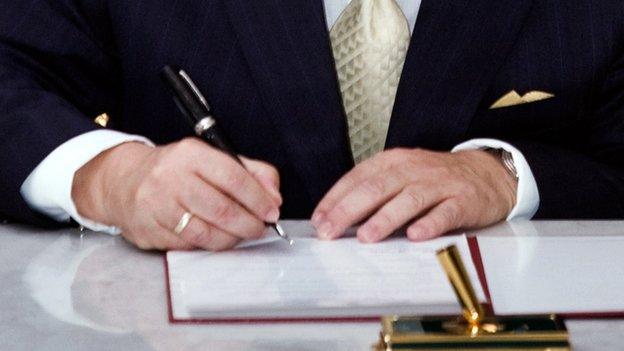EU referendum: David Cameron attacks Eurosceptic case ahead of summit
- Published
- comments
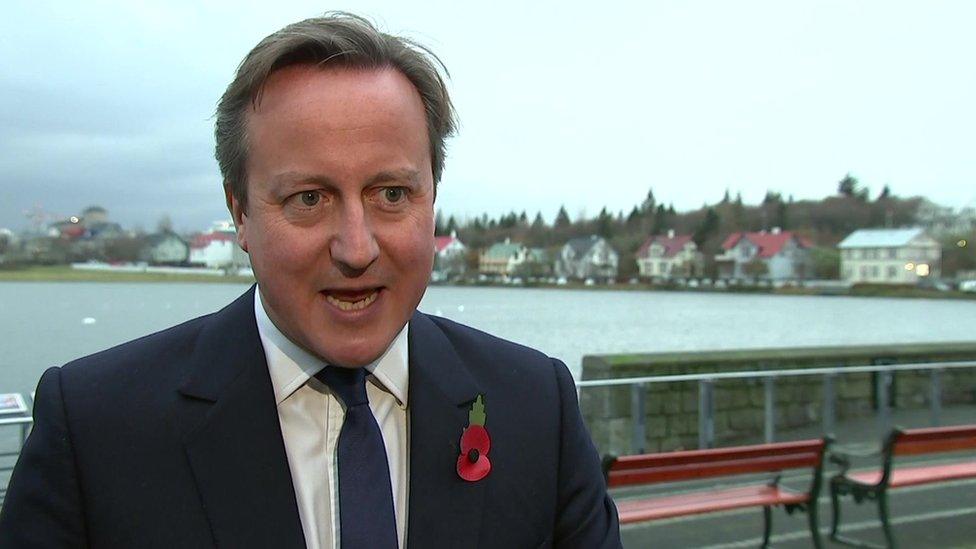
Mr Cameron said there were benefits of being "around the table" when the EU made key decisions
David Cameron has told some Eurosceptics campaigning for an EU exit they are wrong, in the Commons.
The prime minister insists all options are on the table as he battles to recast Britain's relationship with Brussels - including leaving the EU.
But he would "guard very strongly against" wanting to emulate Norway, as some Eurosceptics have suggested.
UKIP leader Nigel Farage has said Norway thrives outside the EU as it saves on membership fees and red tape.
But Mr Cameron took this argument on as he travelled to Iceland for a summit of Northern European leaders - he has previously avoided arguing directly with Eurosceptics, many of whom are on his own Conservative benches.
Latest updates of all the day's political developments on BBC Politics Live
Speaking at Prime Minister's Questions, he said: "If we don't get what we need in our negotiations I rule nothing out, but I do think it's important that as we have this debate as a nation that we are very clear about the facts and figures of the alternatives.
"Some people arguing for Britain to leave the European Union - not all people, but some people - have particularly pointed to the position of Norway saying that is a good outcome. I would guard very strongly against that.
"Norway actually pays as much per head to the EU as we do. They actually take twice as many per head migrants as we do in this country but of course they have no seat at the table, no ability to negotiate.
"I'm not arguing that all those who want to leave the EU say they want to follow the Norwegian path but some do and I think it's very important in this debate that we are absolutely clear about the consequences of these actions."
Speaking later in Iceland, where he is attending a meeting of the Northern Future Forum, the PM said he wanted the British people to understand what the so-called "Norway option" involved, arguing that "while they pay, they don't have a say - they don't have a seat around the table".

Iceland's PM on UK's EU relationship
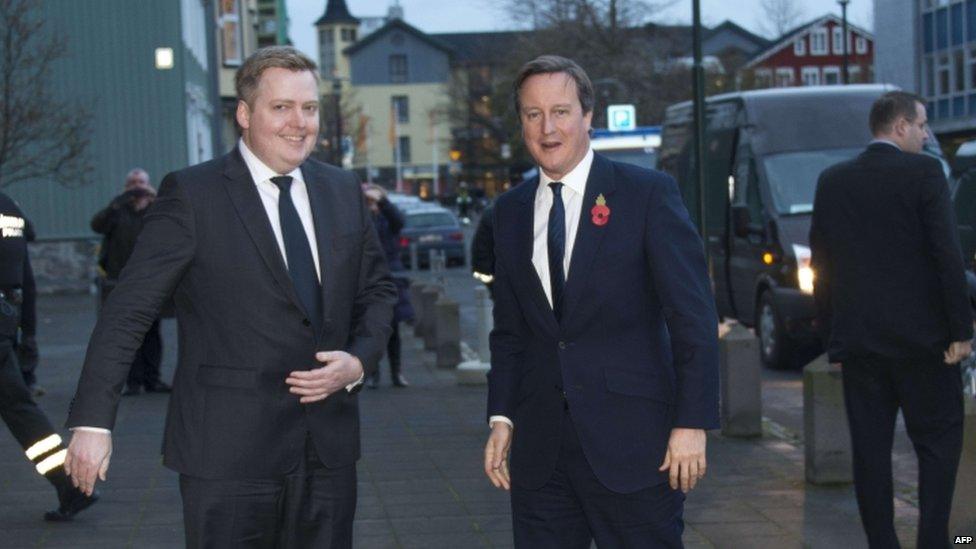
Iceland's Prime Minister, Sigmundur Gunnlaugsson, has told the BBC's Laura Kuenssberg that a looser relationship with the EU "might be better for the UK".
Iceland, like Norway, is a trading partner with the EU and is not a full member, a status that Mr Gunnlaugsson says "British politicians could look into", saying being outside the EU has been "essential" to his country's prosperity, and for the "things that really matter", they are in full control.
Not being in the EU helped his country get out of its financial crisis, added Mr Gunnlaugsson: "Having our own currency, which was absolutely essential, having control over our own laws to the extent that we could address the specific difficulties presented by the economic crisis, for example with the emergency acts and thirdly having control over our own natural resources."
Asked if the looser relationship his country has with the EU was a model for the UK, he said: "I wouldn't like to tell British politicians what to do - concerning the EU, it maybe one of the things they want to look into when they have this debate about Britain's relationship with the EU.
"Maybe some third alternative is better for the UK, I couldn't say or at at least I wouldn't like to speculate."

UKIP's MP Douglas Carswell told BBC Radio 4's World at One: "The reason why Norway gets such a duff deal is because the political elite in Oslo wanted Norway to join the EU so they negotiated as a prelude to membership."
But when the "ministers and mandarins" asked the Norwegian people if they wanted EU membership "the people said no," he added.
"Once we've had our referendum to say no to EU membership, we can get a much better deal than Norway has," said Mr Carswell.
The Vote Leave campaign's Robert Oxley said Mr Cameron was making a "spurious argument" because surveys showed the majority of Norwegians were happy with their country's relationship with the EU.
'PR exercise'
He said his group did not support the "Norway option" but was confident Britain could reach its own post-EU trade deal that suited its needs.
He accused Downing Street of engaging in a "PR exercise" by attacking the Norwegian option, "a model that they have created" to distract attention from what he said was Mr Cameron's failure to secure a "fundamentally different" relationship with the EU.
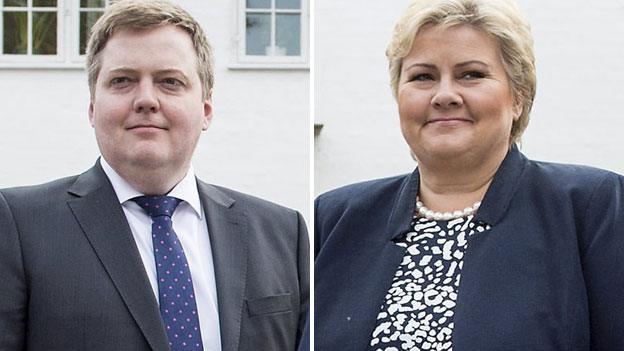
Mr Cameron is meeting the prime ministers of Iceland and Norway during his trip
"What's pretty clear here is that Number 10 haven't got the renegotiation right and now they are panicking," he added.
A member of the Norwegian government told the BBC that despite its looser relationship with the EU, it still had to pay financial contributions to the European Union, adhere to the principle of free movement of people across the EU and adopt directives relating to the single market.
Vidar Helgesen, minister for EU affairs, said Britain must make up its mind where its future lay but he believed it was a positive influence on the EU.
"For Norway, it is a good thing if Britain remains within the EU because the laws we take in pertaining to the single market are made in the EU and we think decisions are better with the UK at the table. When we receive legislation we want it to be as free market and as unbureaucratic as possible."

Analysis by BBC Political Editor Laura Kuenssberg
Laura Kuenssberg: Cameron's Iceland message
The prime minister arrives at this summit in Iceland with a new tone and a new tempo to his arguments.
One minister told me that, at the very least, you have to look as if you're trying.
The difficulty, of course, is that David Cameron's message is nuanced - let's stay in if certain conditions are met; if not, he is ready to tell you to do the opposite.
Hardly a clear slogan a spin doctor would desire but now a message that Mr Cameron will try to sell.

It comes as EU vice president Frans Timmermans said he was open to Mr Cameron's demand to be allowed to opt out of the EU commitment to "ever closer union" between member states.
Mr Timmermans told BBC Radio 4's Today programme: "Nobody would tell you you're forced into integration with other European countries - fair enough if you don't want that."
He said the meaning of "ever closer union" as it is written into EU treaties needed to be clarified.
Mr Cameron is expected to have talks with the leaders of both Iceland and Norway at the Northern Future Forum, a grouping which also includes EU members Denmark, Estonia, Finland, Latvia, Lithuania and Sweden.
Labour's shadow foreign secretary Hilary Benn said: "David Cameron is now waking up to the huge risks of stumbling out of the EU rather than posturing to try and keep his backbench MPs happy.
"Labour has consistently said that in an increasingly interconnected world Britain should be leading from inside Europe, not watching from the outside as others take decisions that affect jobs, growth, investment and our security without having a voice at the table."
- Published30 December 2020

- Published1 June 2015
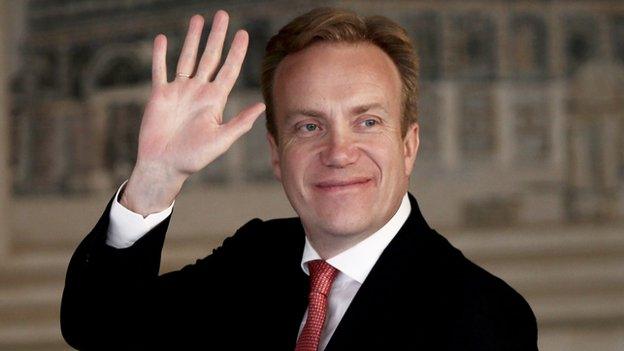
- Published1 February 2016
